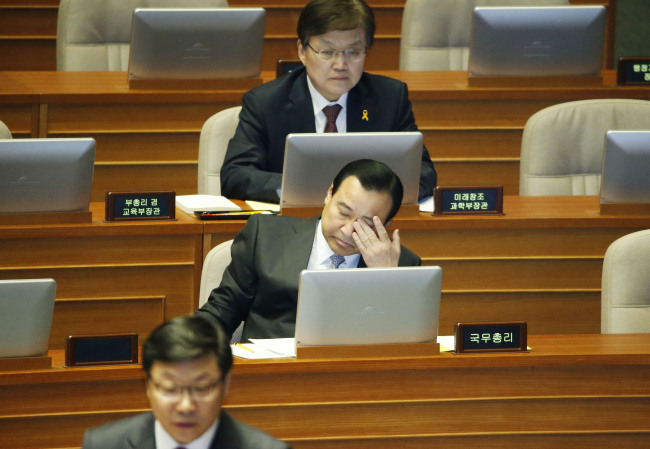President Park Geun-hye said Wednesday that she would not tolerate any officials involved in corruption or irregularities amid escalating graft allegations over her aides, including Prime Minister Lee Wan-koo.
“I won’t tolerate anyone responsible for corruption. The people won’t forgive them, either,” said Park at a meeting with ministers.
“Fresh allegations have been raised in the investigation process and the case should be rectified as part of political reform,” she added.

Prime Minister Lee Wan-koo attends the parliamentary interpellation session at the National Assembly on Wednesday. (Yonhap)
The remarks came amid intensifying bipartisan pressure on Lee to leave his post. It was the first time for the president to speak up on the issue. She leaves for a 12-day Latin American tour on Thursday.
The president also urged officials to take the case as an opportunity to disclose wrongdoings in the political circles hidden in the past and today.
“(Political reform and cracking down on corruption) is a path to the future, economic revitalization and preventing tragedies and troubles. ... Without rooting out such practices, it is vain to make efforts for economic recovery.”
The prime minister is accused of accepting 30 million won ($27,000) in cash from late Keangnam chairman Sung Woan-jong while Lee was running for a parliamentary seat in April 2013. Sung was found dead last Thursday with a memo in which he wrote eight names of political bigwigs including the prime minister and Park’s chief of staff Lee Byung-kee, suggesting they had received money from him.
Lee denied the claim and rejected mounting calls to resign.
“I, an elected official, can’t decide whether to step down or not, (after being threatened) by a memo or unilateral claims,” Lee said at an interpellation session at the National Assembly.
Despite Lee’s repeated denial of graft accusations, the ruling Saenuri Party stepped up demands for Lee to resign with circumstantial evidence emerging that he accepted illegal political funds from Sung.
The Kyunghyang Shinmun, quoting Sung’s aide, claimed that the businessman delivered a small box filled with cash to Lee on April 4, 2013, at his office in Buyeo, South Chungcheong Province, where he was campaigning for a by-election.
Making financial contributions to politicians without clarifying the donors’ names or reporting to the election watchdog is illegal in Korea. If the allegation is proven true, Lee could face up to five years in jail or a maximum fine of 10 million won.
Local cable network JTBC also reported that the two were close, contrary to the prime minister’s claim, as Sung’s diary indicated that they met 23 times over a year.
With tension over allegations against Lee reaching boiling point, some leading figures in the ruling party have started to publicly demand the prime minister to voluntarily step down from the post.
“How could the prime minister, who faces a corruption probe, be deputy for the president if she leaves for (Latin America) on the 16th?” said Rep. Lee Jae-oh at a party meeting.
“Whether (the allegations) are true or not, the prime minister should quit on his own.”
The main opposition New Politics Alliance for Democracy also intensified attacks, threatening that the party would consider inquiring Lee’s impeachment if he keeps his position.
“If Prime Minister Lee does not step down voluntarily, we will review impeaching him in accordance with the Constitution,” said NPAD Rep. Jung Chung-rae.
Under the law, the National Assembly can introduce an impeachment motion of a president or a prime minister, if they violate rules of the Constitution or common laws. The parliament can initiate an impeachment motion against a prime minister if one-third of the lawmakers endorse it. No South Korean prime minister has been impeached.
The special prosecutorial team investigating Sung’s claims raided the office of Keangnam on Wednesday afternoon and seized accounting documents, internal reports and computer hard disks, in their search for records of clandestine political donations.
By Cho Chung-un (
christory@heraldcorp.com)






